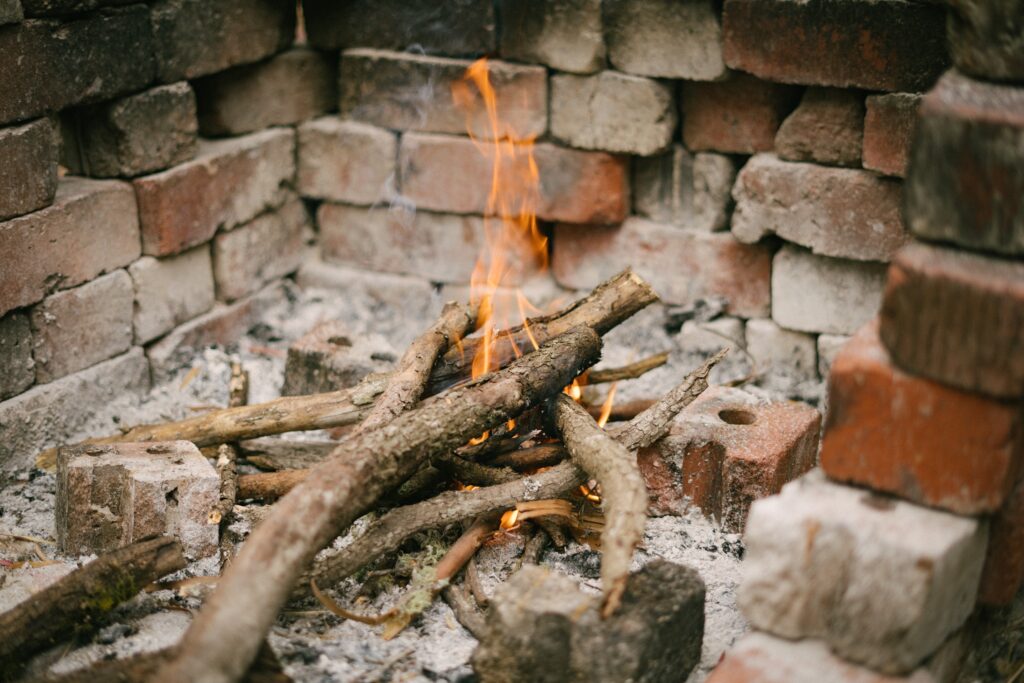Will Bricks Explode In A Fire Pit?
Fire pits can add warmth to a cold evening and be the centerpiece of a patio or backyard living area. There are many different types of fire pits, and some of them use different materials, like bricks. Putting together fire pits is a common way to use bricks. There have been times when fire pits have exploded, and there is no clear reason for it. Most people would like to know if bricks are to blame. So, will bricks explode in a fire pit?
Most of the time, bricks only explode in a fire pit when they get too hot. There will be a lot of pressure build-up in the bricks because of the rapid heating of the water inside them, which causes the bricks to burst into flames. If the pressure is strong enough, the brick could break into pieces or even fall apart. It’s almost always true, though, that bricks will break and pop in a firepit.

Will Bricks Explode In A Fire Pit?
Usually, if the wrong materials are used to build a fire pit, it will start to blaze up and get very hot. There are some materials that can hold water inside of them. When used in fire pits, they get hot and explode.
In many fire pits, brick is the material used to build them. Because they are inexpensive, they are frequently chosen. They can also differ in density, composition, porosity, and temperature resistance. So, you might wonder if they can explode in the fire pit. This is why.
The answer is yes, they have the potential to blow up! However, this is quite rare. There is one significant reason why a brick will explode in a fire pit: if there is any water trapped inside the brick.
Because of their porous nature, bricks may hold a significant amount of water. So when a brick with water in its pores is put in a fire pit, the water quickly gets hot and turns into vapor. This vapor builds up a lot of pressure inside the brick, which can cause it to explode.
In addition, if a brick is subjected to excessive heat in a fire pit, it may explode. High temperatures can weaken the brick’s structure, which could cause it to break off or even explode.
Despite this, it should be noted that the likelihood of a brick exploding in a fire pit is extremely low. Typically, they crack, crumble, and pop due to the fire pit’s high temperatures.
How Much Heat Can Bricks Withstand?
There are various types of bricks, and each exhibits a distinct level of resistance to heat. Fire bricks are bricks that can endure the maximum heat. These are white bricks that are predominantly made of alumina and silica. Fire bricks are also available in different types. The best fire bricks can resist temperatures up to 2,460°F.
Red bricks are almost as resistant to fire as firebricks. While red bricks are not as robust as firebricks, they can sustain the same heat until they degrade. It is true that they can tolerate at least 1,750°F, sometimes even more, depending on their quality.
Even though masonry bricks are not designed to survive fire, they may tolerate a significant quantity of heat. A typical masonry brick can take up to 1,000 degrees Fahrenheit before deteriorating. As a result, these are not suggested for use in a fire pit.
Can You Use Regular Bricks in a Fire Pit?
A fire pit can be constructed using standard bricks. It is an extremely affordable solution that is readily available. There’s also the fact that new regular bricks can hold heat, don’t hold water, and let water vapor pass through them.
The issue with standard bricks is that they are brittle. In comparison to fire bricks, those bricks are not remarkably durable or sturdy. While they can sustain considerable heat, there is a substantial risk that the bricks will break off or crack within a short period.
Will Red Bricks Explode in a Fire Pit?
Red bricks can endure temperatures of up to 1,750°F, as previously stated. As a result, they are an excellent substitute for fire bricks.
Red bricks, on the other hand, are porous and do not readily absorb water. The pores in the bricks allow water vapor to easily escape, allowing the heat to be released. As a result, making a fire pit out of red bricks isn’t a big deal. It’s not very likely that red bricks will explode because they have a lot of holes that let the water go through.
In most cases, red bricks won’t explode unless other materials or concrete around them manage to block off the pores, creating a water-settling area inside the fire pit.
It is possible, though, that the red bricks will crack if you are building a massive fire. Red bricks cracking or breaking at high temperatures is a common occurrence. That being said, fire bricks are far superior to red bricks for a larger fire with high temperatures.
Will Fire Bricks Explode in a Fire Pit?
Fire bricks are designed to resist the heat of a fire. Because of their composition, they can withstand temperatures of up to 2,460°F. As a result, it is doubtful that fire bricks will explode when exposed to high temperatures.
As opposed to concrete, experts advocate utilizing fire bricks instead because they do not collect much water and have enough pores for the water vapor to travel through. So you can adequately heat these bricks without the worry of cracking or explosion.
Best Bricks for Your Fire Pit
When you build a fire pit, you should use good bricks. Building a fire pit needs to use bricks that can handle a lot of heat, keep the fire from getting hot, and are safe. Some bricks you can use to build your fire pit:
1. Rutland Fire Bricks

Fire bricks from Rutland Products are a great option if you’re on a budget. These bricks are highly durable, cost-effective, and capable of withstanding high temperatures. They’re also lovely and will enhance the decor. Experts and the general public highly praise and suggest its design. In terms of size, the bricks measure 9 x 4.5 x 1.25 inches and weigh 4.01 pounds.
2. GIRtech INSA Insulation Fire Brick

GIRtech INSA Fire Brick is made from eco-friendly components and is safe for human health. The INSA brick can be used in any type of heating unit, and it is capable of withstanding fires at 2370 F or higher. This means that you can safely use this fire brick to protect the inside lining of your fireplace, stove, or furnace against fierce heat.
3. Executive Deals Fire Brick

Executive Deals Insulating Fire Brick is another fantastic alternative. These are incredibly light and long-lasting. They have a lengthy lifespan and can tolerate extremely high temperatures. However, because they are so light, they aren’t as robust as other types of fire bricks. These blocks are 9 X 4.5 X 2.5 inches and weigh 2.15 lbs.
How To Choose The Best Bricks For Your Fire Pit?
It can be hard to choose the right type of brick for your fire pit. To get the best fit, you might have to think about many things. When you choose brick, think about these things:
1. Refractory Properties
It is a brick that can stand up to heat better than other bricks. That’s why, when you pick the best brick for your fire pit, you need to look for one that is very refractory. Such a brick will be able to stand up to the very hot fire pit. When it comes to fire bricks, for example, they can withstand 1800 degrees Fahrenheit.
2. Thermal Conductivity
Less thermal conductivity is better for your fire pit bricks. Your fire pit will be more energy efficient as a result of this.
3. Composition
A brick’s chemical composition is crucial to keep in mind while deciding. Having too many or too few of any of the brick’s components might have a negative impact on the brick. A typical brick is a silica, alumina, magnesia, lime, iron oxide, and alkalies. Due to chemical composition, some bricks are dense and hefty, while others are light and brittle.
Final Remark
In conclusion, it is recommended to use fire bricks for a fire pit. This will ensure that the bricks will not explode in the heat of the flames.







